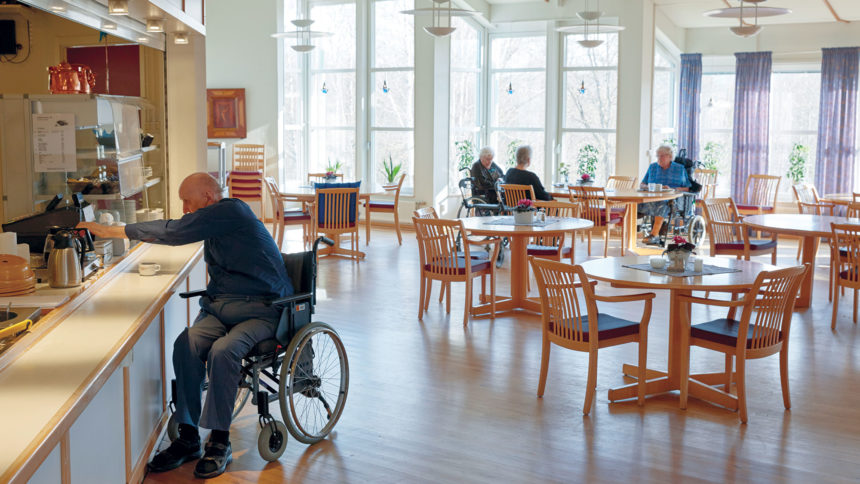
As senior living operators navigate the COVID-19 pandemic, some states are crafting guidance for reopening senior living communities to visitation.
The Minnesota Department of Health released detailed guidance Monday creating a multi-step framework for reopening the state’s assisted living communities and nursing homes to family members and outside caregivers. State regulators are recommending that facilities consider COVID-19 infection rates in the greater community before relaxing visitation policies, as well as any exposure by a resident, staff or visiting service provider within the past 28 days.
Among other factors providers should consider, according to the guidelines, include facility size and the extent to which staff are working at other long-term care facilities, adequate staffing levels, access to personal protective equipment, local hospital capacity, and staff and visitor screening. The guidance calls for facilities to develop testing plans — testing is required for nursing homes, but only recommended for independent living, assisted living and memory care communities.
In Florida, Gov. Ron DeSantis announced he’s launching Florida’s Task Force on the Safe and Limited Re-Opening of Long-Term Care Facilities to examine safe ways to reopen long-term care facilities for limited visitation. The group will solicit feedback from families and propose steps moving forward.
Among members of the task force are Gail Matillo, president and CEO of the Florida Senior Living Association, and Emmett Reed, executive director of Florida Health Care Association, as well as Mary Daniel, who took a job as a dishwasher at her husband’s memory care community when visitation was suspended.
LeadingAge Florida President and CEO Steve Bahmer had been a member of DeSantis’ Re-Open Florida Task Force, a multi-industry group that in May outlined recommendations on reopening the state.
The formation of the new task force comes as the state is approaching the height of the hurricane season. The state Agency for Health Care Administration reports that all of Florida’s nursing homes, and all but one of its 3,112 assisted living communities, now have generators to keep residents cool during prolonged power outages.
Generators were mandated after a dozen residents died at the Rehabilitation Center of Hollywood Hills following Hurricane Irma in 2017. State laws passed in 2018 require every assisted living community and nursing home to have an alternative power source onsite with enough fuel to keep residents cool and safe for at least 96 hours.
Some operators, however, have less powerful, temporary generators, which may require moving residents into a single large space, increasing their risk of transmitting the virus, according to media reports. The state maintains a website that lists every facility and what type of generator it plans to use in an emergency.
In other coronavirus-related news:
- Weekly stipends for healthcare workers in New Hampshire’s long-term care facilities, including senior living communities and nursing homes, expired July 31, raising concerns the move could trigger widespread staffing shortages. Gov. Chris Sununu said he will not extend the program because there has not been enough federal support for the state’s budget. The state spent almost $60 million on the program, providing stipends to 23,000 frontline workers, including nurses, housekeeping staff and kitchen staff.
- Staff members in North Carolina’s long-term care facilities, including assisted living communities, are being tested for COVID-19 on a biweekly basis through at least November. The state’s health secretary issued the order Friday that shifted the staff testing requirement from recommended to mandatory. Facilities will be required to report all test results. Federal CARES Act funding will be used to pay for the additional testing.
- The Michigan Attorney General’s Office is ramping up efforts to enforce Gov. Gretchen Whitmer’s executive order containing rules and procedures that long-term care facilities, including assisted living communities, must follow to protect the health of employees and residents, including barring evictions for nonpayment, canceling communal dining and group activities, implementing disinfection and sanitation regimens, providing PPE to employees, informing employees of COVID-19-positive residents/patients, and reporting presumed positive cases and additional data to local health departments and the Michigan Department of Health and Human Services.
- The Empire State Association of Assisted Living testified before the New York state legislature’s residential healthcare facilities and COVID-19 hearing on Aug. 3. The goal was to educate and inform the legislature on the unique challenges assisted living communities face during the pandemic and ask for support in the key areas of funding, testing, PPE and policy.
- Canal Street Crossing, a private residential and healthcare development in Bourne, MA, is bringing a new model for long-term care to Massachusetts just as the impact of COVID-19 is being fully realized. The program uses the Green House model, with certified nursing assistants and private suites wired with telehealth technology. GenReal will own the project. The assisted living, skilled nursing care and memory unit beds will be managed by Navigator Elder Homes. A Program of All-Inclusive Care for the Elderly will be integrated on the campus and owned and administered by Harbor Health Services.
- Handle With Care, a Texas company, worked with Unlimited Care Cottages, an assisted living provider, to design and build hugging booths to relieve the loneliness and isolation that many residents have felt during the coronavirus pandemic. The booths fit into a standard door without gaps and are built with coronavirus-safe materials.
- The Assisted Living Pen Pal program invites anyone to write letters and notes of good cheer to residents in assisted living and home healthcare facilities in Rockwall, TX, and beyond. The project was created by a former assisted living employee who wanted to find a way to give back to the community during the pandemic.
- Parmer Woods assisted living residents in North Austin have used their time during the pandemic to make beer. Residents have brewed cider, India pale ale, oatmeal stout and wit beer in the facilities kitchen with gear they found left by a former maintenance director.


